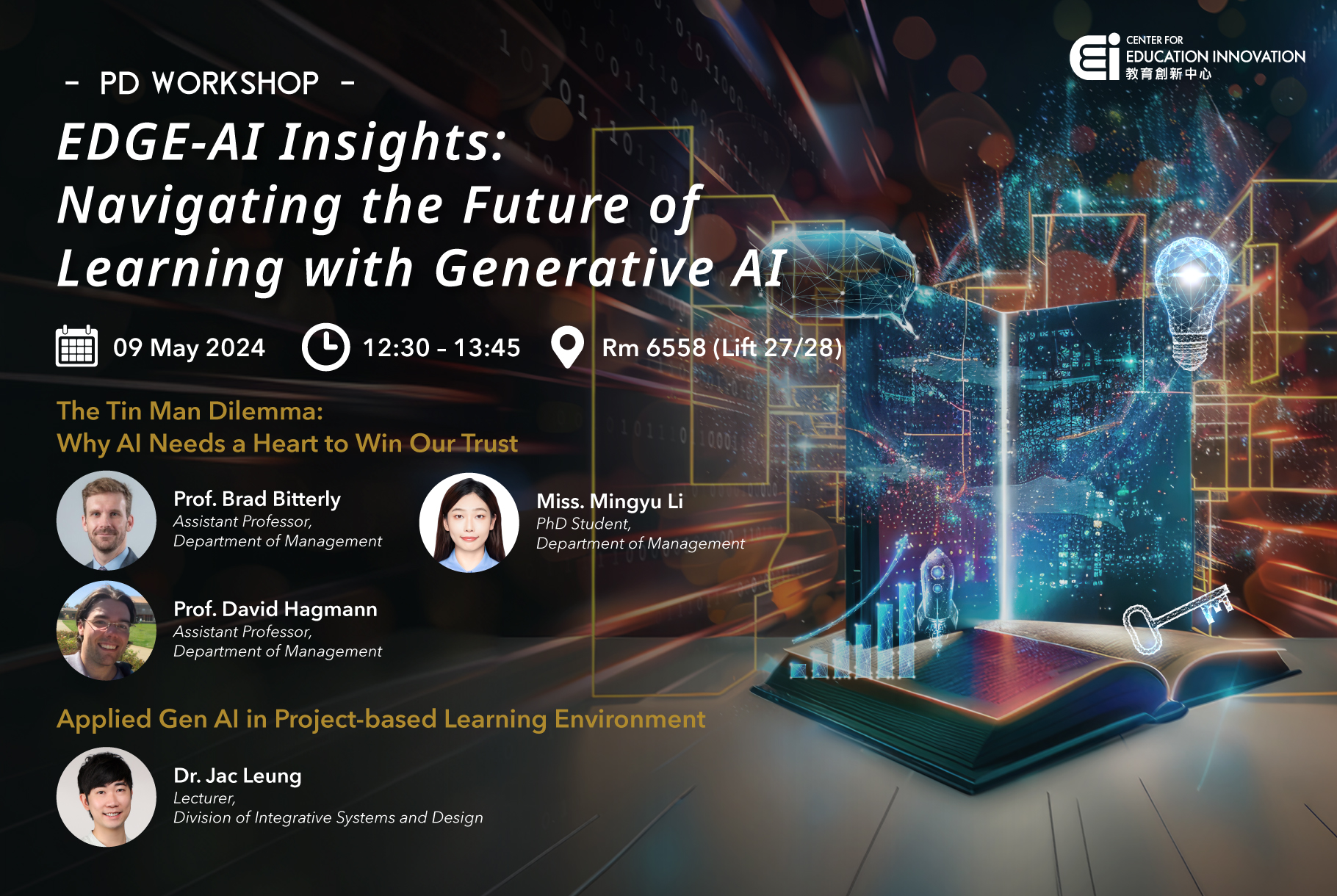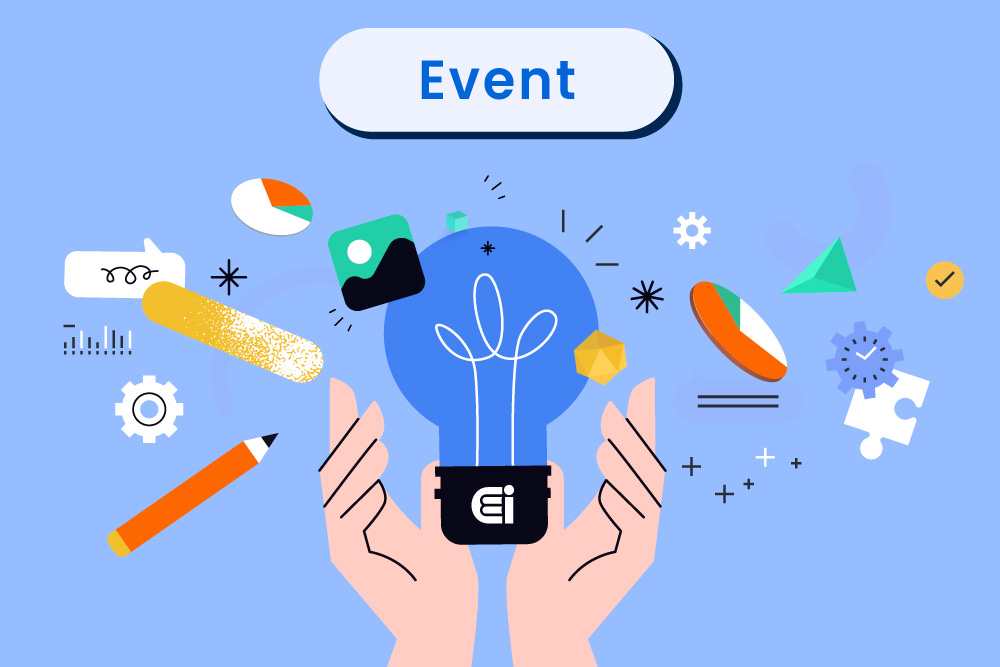EDGE-AI Insights: Navigating the Future of Learning with Generative AI
Body
Last Spring, the CEI invited faculty and teaching staff to propose Education and Generative AI (EDGE-AI) projects to explore new teaching and learning methods for using generative AI technology in teaching and learning. A year on, these projects are yielding important findings for best teaching practices. In this workshop, two of our EDGE-AI projects share their work so far, their findings, and how these findings can help shape the new landscape of generative AI in teaching and learning.
Co-Creating the Future of Education: Innovations in Student Partnership Initiatives
Body
This workshop showcases the collaborative efforts of student partnership teams from HKUST, HKBU, and HKU, demonstrating the transformative potential of student-staff collaborations in shaping the future of higher education. These partnerships have led to developing unique projects that enhance learning experiences and embody the essence of co-creation in education.
Participants will be introduced to various initiatives, including projects that gamify medical education to increase empathy and awareness of healthcare disparities, design learning activities to enhance financial literacy skills and enhance students’ teaching experience with AI technology. These initiatives exemplify how student partnerships can improve learning outcomes, equip students with skills for the future, and innovate teaching methods.
The session will offer valuable insights into the strategies and advantages of student partnerships, highlighting how they can inspire students to take an active role in their education. Furthermore, it will provide faculty members with fresh perspectives on teaching, enhancing their understanding of student experiences and needs.
UGC Teaching Award Recipient Sharing: Mind the Gap – What makes it work for the ‘Generation Z’ students?
Body
In this talk, Michael Botelho shared some perspectives relating to the generation gap that is perceived with the new “generation Z” students, and how we can manage this gap. In addition, he has explored the activity gap that exists in some traditional teaching classrooms and how to adopt an active and evidence-based approach. He also mentioned the use of the communal consultation video that allows one-on-one student consultations to be shared with the rest of the class for on-demand learning. Finally, he mentioned the transition gap that exists for dental students and teachers as they travel across their learning and teaching career.
In-situ Inquiry: Engaging students through in-class activities
Body
Inquiry-based learning has received increasing attention and is shown to promote students’ learning in higher education. However, bringing inquiry-based activities such as case studies and hands-on demonstrations into the classrooms could be challenging for many. Some may find it hard to fit activities in already tight teaching schedule, others have limited time to develop new materials, and others may find it hard to encourage active participation. In this workshop, the presenter has shared my experience of designing and implementing interactive, guided inquiries for students in small (<20) and large (>100) classes for majors and non-majors both in Hong Kong and abroad and have demonstrated a few of those techniques. An open forum discussion was also be held to help participants explore how one may adapt these techniques in his/her own classrooms.
Blended Learning Roundtable Discussion: Creating a participatory learning environment in blended learning courses
Body
The workshop will showcase how Canvas functions were successfully implemented in two BL courses to enhance students’ learning experience.
Common Core Program Series: Creating an Interactive Classroom for Large Classes
Body
Professor Groves will initiate a conversation about how to create a more interactive and participatory learning environment for undergraduates at HKUST. Critically reflecting on the uses of online technology in teaching, he will share some of his practices for engaging students, particularly with respect to what to do on the first day of class, developing assignments, and involving students in reading.
How to save higher education in twenty seven easy steps?
Body
The Minerva project has attracted a lot of attention since its inception in 2014. Minerva presents a new system of higher education -- at once fully compliant with the existing model of higher education and at the same time a fully reinvented end to end experience. Across curricular design, pedagogical modalities, and operational decisions, Minerva's system presents a potential path forward for other institutions of higher education around the world. In this seminar, Ben Nelson has presented how this new system was designed and what other institutions can learn from it.
A Journey of Synthesis at HKUST
Body
A best practice education infrastructure tool adopted by university Mathematics Departments, in very significant numbers since the 1990s, is a walk-in help center. Such a help center offers the large number of students taking background mathematics courses help in acquiring basic mathematical and problem solving skills. Concurrently, the rise of web educational platforms such as the open source online homework system WeBWorK is another infrastructure tool to improve the teaching of basic mathematics.
Blended Learning ≠ Video Making - My joyful journey of moving a course out of traditional lecturing
Body
In this sharing, Prof. Chii Shang has walk through some importance and tricks he learned from his joyful journey of converting a traditional lecture-base course to a blended, peer, team-project-based, and even experiential learning course, without the hassle of making lecture videos. The sharing itself was not a lecture/seminar; instead the audience has experienced blended learning and interactions with the speaker.
Creating Meaningful Learning Experience in Experiential Learning Course
Body
As it name suggests, the basis of experiential education involves learning from experience. However, experience alone does not necessarily lead to true learning unless the experience is carefully chosen, authentic and well-structured. Given “experience” is the heart of experiential learning education, the course design, instructor’s facilitation, and assessment are all working towards one goal: to provide the conditions and create the experience for learning to happen. In this seminar, the speakers will use ENGG2900D (Community Services Project: Underwater Robot Community Engagement Project) as a showcase of how to use underwater robot as a driving vehicle to create meaningful learning experience for both UST students and the targeted serve group of school children with special education needs (SEN) or the ethnic minorities. This SENG, SSCI, and SBM co-listed course* was offered twice in Spring 15 and 16 respectively, the speakers will share the experience gained in the design, implementation, and assessment of this experiential learning course.




